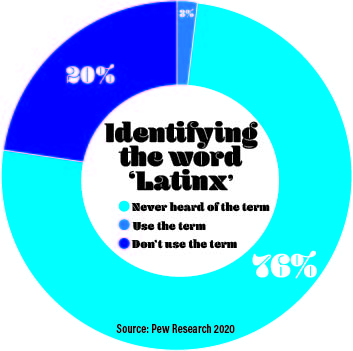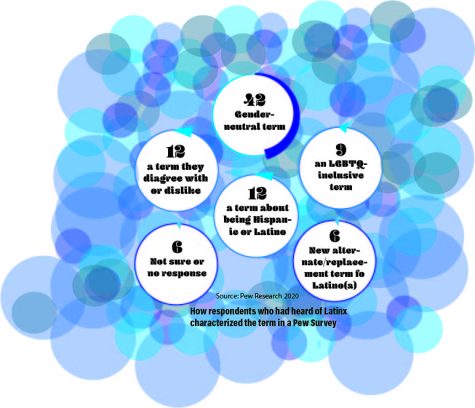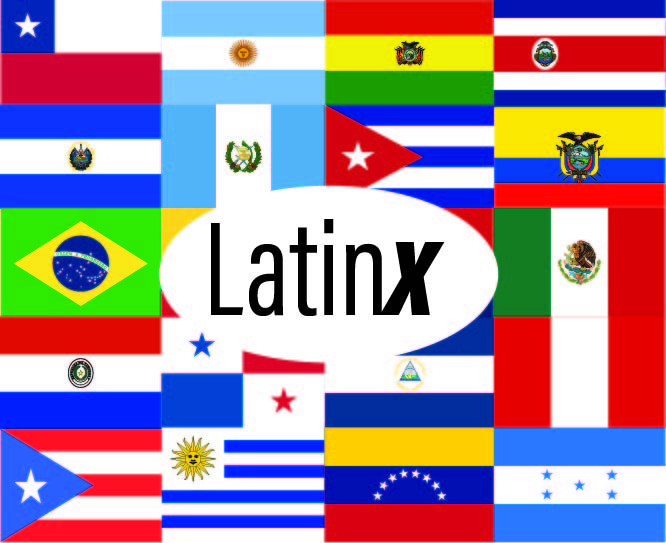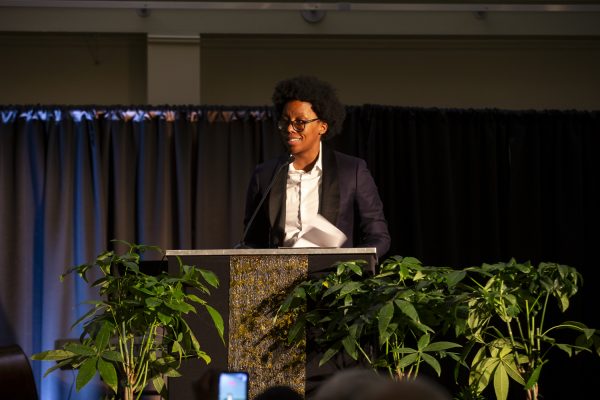Some in Hispanic and Latino community say Latinx is a white-washed term
Hispanic and Latino faculty and students said the term might not be as inclusive as some think.
December 7, 2021
The word Latinx originated in the early 2000s as a more inclusive version of the term Latino, though some say the word can be traced back to chat rooms from the 1990s. The University of Iowa is home to many people who identify as Hispanic and Latino/a/x, but as with any group, each person has their own view on the word Latinx.
In the Spanish language, many words are gendered by masculine and feminine vowels “o” and “a.”
Latinx first appeared in the Merriam-Webster Dictionary in 2018. The Royal Spanish Academy oversees making changes to the Spanish language, and has turned down any requests to make the Spanish language gender neutral.
A 2020 study from the Pew Research Center showed that one in four Hispanics have heard of the term Latinx and only 3 percent use it.
A more recent survey from Democratic consulting firm Bendixen & Amandi International, found that only 2 percent of respondents used the term, according to Politico. According to the report, 40 percent of respondents said “Latinx” bothers or offends them to some degree, and 30 percent said they’d be less likely to support a political candidate who uses the term.
Jorge Guerra, UI professor of Latino/a/x studies, said his main issue with the word comes from people, specifically white moderates and liberals, who impose the term on him as an individual, especially because he identifies as Latino.
“I personally cannot stand academics who impose that term on me,” he said. “And I, as a person who’s part of the community, am just supposed to just accept that term.”
He does not use Latinx to identify himself because it feels superficial. He said he is OK with Latinx referring to Latin American people as a whole, however.
“I don’t feel at all any sense of community or communication when someone approaches me that way,” he said. “I like to call ‘Latinx,’ in many respects, the whitening and the whitewashing of the terms Latina and Latino.

Guerra said he first heard the term at the UI. He said he was given the impression that Latinx was the only term that should be used and that terms like Latino and/or Latina should be disposed of.
“And I think this is when my fervent opposition comes with the word itself,” Guerra said. “Because I’m the type of person that believes in multiculturalism and believes in the belief systems that we need to live in a pluralist society in which your belief systems have to coexist in respectful and safe manners.”
Guerra said that disposing of the terms “Latino” and “Latina” in favor of Latinx erases the work of previous generations who referred to themselves as Latinos and Latinas.
George Cadava, director of the Latino and Latina Studies program at Northwestern University, said in a USA Today article, the term Latinx erases the work of feminist movements in the 19th century.
“I think languages are created by people, right? And they change with time and with how people use words or not use them when they stop using them,” said Javier Hernandez, a UI Spanish teaching assistant.
Hernandez said he heard the word “Latinx” for the first time on the UI campus.
“I was just looking at a survey that said that it was a very unknown word, even among Latinos in the U.S., ranging from age to age group, but it was even more unknown for people in Latin America,” Hernandez said.
There have been proposals by some to use the word, “Latine” as a gender-neutral alternative. Some Spanish speakers prefer this term because the “e” has a more practical Spanish pronunciation, unlike “x.” In Spanish, Latinx would be pronounced “Latinequis,” said Alejandro Gonzalez, a first-year UI film and cinema major.
“I’m going to be honest, I don’t like [Latinx] that much because it feels like a term that’s very friendly for English speakers, but not for Spanish speakers” Gonzalez said.
Gonzalez, who is a native Puerto Rican, came to Iowa to pursue higher education. Coming from Latin America, Gonzalez has witnessed both sides of the Latinx argument.
Gonzalez said he feels Latinx has been used mostly by people who aren’t a part of the Hispanic and Latino community.
“I’d say ‘Latinos’ is good enough, because most of the people.” Gonzalez said. “I’ve seen use the word Latinx aren’t necessarily Latin people. It’s more just non-Latin Americans, who are just white people,”
Guerra said he feels much more comfortable with “Latine” being used as the gender-neutral term, rather than ‘Latinx’.
“Latine is easier to pronounce, less confusing to see, much more approachable for Spanish speakers across the immigrant communities of the United States,” Guerra said.
Melanie Flores, a UI first-year hearing and speech major, said she would prefer “Latini” as the gender-neutral term, because it flows well.
“It’s easier to say,” she said.

Despite the emergence of the term among Americans, opinions on the term among Latin Americans about the word range from discomfort to disgust.
Hernadez said languages are constantly evolving, but the introduction of the word Latinx brings an internal conflict between younger and older generations.
“I feel like the older generations feel like young people are just trying to replace traditions.” Flores said. “So then, older people are more bound to respect what’s been known throughout history, and they find it rebellious when you try to change it.”
Flores remembers hearing the term Latinx in Mexico, her home country, and the conversations her family had about it.
“When I go to Mexico, I don’t really see it.” Flores said. “And when I do, it’s seen as, ‘Oh, those rebellious kids trying to change something that’s fine.’”
People interviewed by The Daily Iowan said they doubted the term will become widely used by Latin Americans.
Gonzalez said, in Puerto Rico, the term has received backlash, with some people going as far as calling it a slur.
While Gonzalez said he personally doesn’t think the word is a slur and does appreciate the inclusivity of Latinx, he feels that the term, Latinos, is inclusive enough, as it includes people across the gender spectrum.
Hernandez said time will tell if the term gains widespread usage or not. He said a piece he had to read in a Medieval Spanish Literature course written around 1,000 A.D. shows how much language can change over time.
“I remember people in the class being like, ‘Is this Portuguese?’ Because it looks more like Portuguese than it did Spanish as we know it today,” he said. “So, I guess that goes to show you how languages transform.”















